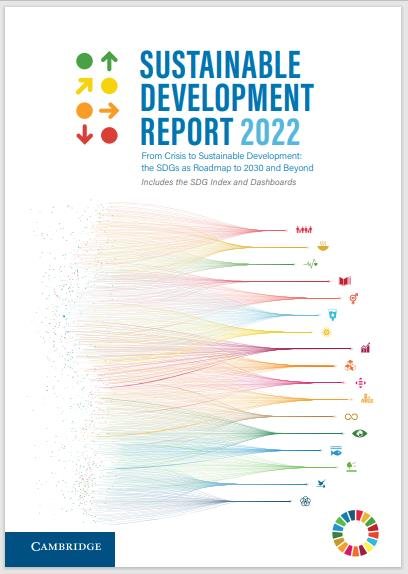 Read this article in French
Read this article in French- Share this article
- Subscribe to our newsletter
Sustainable Development Report (SDR)
Multiple and simultaneous international crises have halted progress on the Sustainable Development Goals (SDGs). This is the conclusion of the Sustainable Development Report (SDR) published by the Sustainable Development Solutions Network (SDSN) in early June 2022. For the second year in a row, the world is no longer making progress on the SDGs. According to the report, a global plan to finance the UN Sustainable Development Goals is urgently needed.
The report includes the SDG Index and Dashboards, which track the progress countries have made towards achieving the SDGs. For the second year in a row, the global SDG Index score declined slightly in 2021, largely due to the impact of the pandemic on SDG 1 (No Poverty) and SDG 8 (Decent Work and Economic Growth), and poor performance on SDGs 11‐15 (climate, biodiversity, and sustainable urban development).
In addition to their massive humanitarian costs, military conflicts – including the war in Ukraine –are severely impacting food security and energy prices worldwide, and these spillover effects are amplified by climate and biodiversity crises. Conflicts and crises divert attention away from long‐term goals and investments. Peace, diplomacy, and international cooperation are fundamental conditions for the world to progress on the SDGs towards 2030 and beyond.
The 2022 SDG Index is topped by Finland, followed by three other Nordic countries – Denmark, Sweden and Norway. The top 10 countries are all in Europe. Yet even these countries face major challenges in achieving several SDGs. Overall, East and South Asia has outperformed all other regions since the adoption of the SDGs in 2015, with Bangladesh and Cambodia heading the list of countries with the greatest positive change. By contrast, Venezuela has declined the most on the SDG Index since 2015.
The report presents a five‐point global plan for financing the SDGs and underlines the key role played by the G20, the International Monetary Fund (IMF) and Multilateral Development Banks (MDBs) in expanding SDG financing worldwide.
At mid‐point on the way to 2030, the integration of the SDGs into national regulations, budgets, monitoring systems and other government policies still varies greatly across countries. Among G20 member states, the United States, Brazil, and the Russian Federation exhibit the least support for the 2030 Agenda and the SDGs.
By contrast, Nordic countries demonstrate relatively high support for the SDGs, as do Argentina, Germany, Japan and Mexico (all G20 countries). Some countries, for example Benin and Nigeria, have large gaps in their SDG Index yet also earn relatively high scores for their policy efforts. Interestingly, Benin and Mexico have both issued SDG Sovereign Bonds in recent years to scale up their sustainable development investments.
(SDSN/ile)
Full report: Sachs, J., Lafortune, G., Kroll, C., Fuller, G., Woelm, F. (2022). From Crisis to Sustainable Development: the SDGs as Roadmap to 2030 and Beyond. Sustainable Development Report 2022. Cambridge: Cambridge University Press.
The report can be downloaded for free here:
Website
Data visualisation





Add a comment
Be the First to Comment